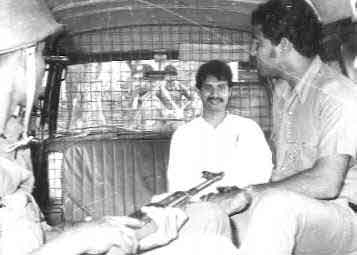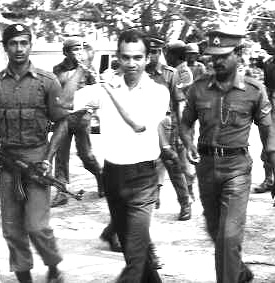THE MARTYRDOM OF
OF THANGATHURAI & KUTTIMUNI "The emergence of a martyr... facilitates patriotism and nationalism: if people feel that someone with whom they identify themselves has been killed, tortured, or otherwise deprived of some value, their indignation is likely to be great and perhaps long enduring..." - Leonard W.Doob: Patriotism and Nationalism, Yale University Press, 1964 - see also - What is a nation?
Introduction - the Trial, 1982/83 The trial of Tamil leaders, Nadarajah Thangathurai and Selvarajah Yogachandran (also known as Kuttimuni) in the Neervely Bank case was the second trial under the notorious Sri Lanka Prevention of Terrorism Act - an Act which was later described by the International Commission of Jurists as containing provisions which were 'an ugly blot on the statute book of any civilised country'. One of the draconian provisions of the Act was that the burden was cast on the accused to prove that any statement made by the accused to the Police was involuntary and inadmissible in evidence. Six members of the Tamil militant movement, Nadarajah Thangathurai, Selvarajah Yogachandran (also known as Kuttimuni), Subramaniam Devan, Nadarajah Sivapatham, Sri Sabaratnam and Nadesudasan were charged in connection with the ambush of a Sri Lanka state owned People Bank jeep at Neervely on 25 March 1981 and the robbery Rs.8 million. Sri Sabaratnam, who was later to become leader of the Tamil Eelam Liberation Organisation was tried in absentia. The trial started on 2 November 1982 and all the accused refused to plead on the ground that they were citizens of Tamil Eelam, that they were engaged in a lawful resistance movement against alien Sinhala rule and that the Sri Lanka Court had no jurisdiction to try them for incidents which, in any event, were alleged to have taken place within Tamil Eelam. Counsel for the Defence, contended that the autochthonous 1972 Sri Lanka Republican Constitution had severed legal continuity with the past and that the Sinhala dominated Constituent Assembly had acted without the consent of the Tamil people and that sovereignity had accordingly reverted to the Tamil state which had been in existence prior to foreign rule. The Defence submitted that the constitutional issue that had arisen should be referred by the High Court to the Supreme Court for determination. The Defence submission was rejected and the ensuing trial lasted 3 months. The Accused gave evidence of the torture that they were subjected to by the Sri Lanka authorities under the Prevention of Terrorism Act. Six months later the International Commission of Jurists reported: "From informal records held in Jaffna, the author has discovered that at least 23 members of the Tamil community have died in, or as a result of being in army or police custody since July 1979....Several instances were reported to the author of persons being hung upside down with a bag covering their head into which was introduced fine ground dried chilli powder. Evidence of the effect of this on the metabolism of the lungs was read by the author in the inquest depositions...From discussions with detainees and families of detainees, the author accepts that it is the almost universal practice of the military authorities to physically assault and mistreat these persons who have been in their custody, with the principal locations for that assault being the Elephant Pass army camp and the Panagoda army camp in Colombo " (Ethnic and Communal Violence: The Independence of the Judiciary: Protection of Fundamental Rights and the Rule of Law in Sri Lanka - Fragile Freedoms? - Report of an ICJ Mission to Sri Lanka in June 1983 - Timothy J.Moore)
Defence Counsel, Nadesan Satyendra addressed the Court from 15 to 17 February 1983 on the question of the admissibility of the alleged confessionary statements. He said: "It is of some considerable importance that the efforts made on behalf of national security do not have the result that no one is any longer secure. If it be otherwise, we in Sri Lanka may well be standing on a slippery slope with no sure way of knowing where or how to stop ... the Court will be mindful, that that which is permitted once may well become a way of life - a way of life which may encourage further abuses and excesses"
He added quoting from Aurobindo's writings in 1907: "The idea creates it martyrs. And in martyrdom there is an incalculable spiritual magnetism which works miracles. A whole nation, a whole world catches the fire which burned in a few hearts;... the idea begins to create its heroes and fighters, whose numbers and courage defeat only multiplies and confirms until the idea militant has become the idea triumphant. Such is the history of the idea, so invariable in its broad lines that it is evidently the working of a natural law"
and concluded: "In relation to my clients I will state this publicly and for the record. I have felt humbled in the presence of persons from my own community, who have been willing to give that which is the most precious thing that humans can give - their lives - for the liberation of their people"
Consistent with their defence, the accused refused to answer the charges laid against them and led no evidence in response to the prosecution case. Also, at the conclusion of the trial, Counsel for the Defence did not address the Court but each of the accused made a statement from the dock. Nadarajah Thangathurai's statement from the dock remains a moving political testament of the movement that he had led with simplicity, dignity and clarity. He declared: "We are not lovers of violence nor victims of mental disorders. We are honest fighters belonging to an organization that is struggling to liberate a people. To those noble souls who keep on prating "terrorism, terrorism" we have something to say. Did you not get frightened of terrorism when hundreds of Tamils were massacred in cold blood, when racist hate spread like fire in this country of yours? Did terrorism mean nothing to you when Tamil women were raped? When cultural treasures were set on fire? When hundreds and hundreds of Tamil homes were looted? Why in 1977 alone 400 Tamils lost their lives reddening the sky above with their splattered blood - did you not see any terrorism then? Did your thoughts and feelings become deadened when it concerned Tamil lives and Tamil property or are your minds unable to conceive the very idea of Tamil suffering?.."
and concluded: "The consequences of the verdict of this Court will not touch us, content as we are that we have done our duty. We will not flinch from embracing death or spending the rest of our lives in jail... All these are merely commonplace incidents in the history of a nation's struggle for freedom. We were fully conscious of what we were doing. Hence there is no question of disappointment... The seeds we sowed were not seeds of poison, our arrow heads were not dipped in venom.. These tribulations are a boon bestowed by God to purify us. The final victory is ours. Long Live Tamil Eelam!''...
All six accused were convicted and sentenced to life imprisonment on 24 February 1983. In July 1983, whilst their appeal to the Supreme Court was pending, Nadarajah Thangathurai, Selvarajah Yogachandran, Devan, Sivapatham, and Nadesudasan were murdered in a high security prison in Welikade whilst in the custody of the Sri Lankan government. They will always be remembered as national heroes by the people of Tamil Eelam.  
Sevarajah Yogachandran (Kuttimuni) and Nadarajah Thangavel (Thangathuria)
leaving the Colombo High Court
|